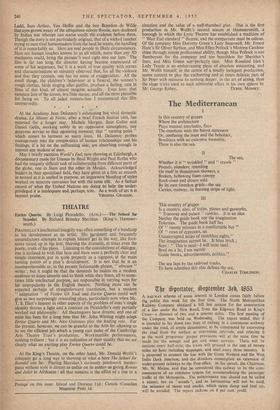THEATRE
Enrico Quarto. By Luigi Pirandello. (Arts.)—The School for Scandal. By Richard Brinsley Sheridan. (King's, Hammer- smith.) PIRANDELLO'S intellectual integrity was often something of a handicap to his development as an artist. His persistent and frequently unsatisfactory attempts to explain himself get in the way, like foot- notes mixed up in the text, blurring the dramatic, at times even the poetic, truth of his plays. Listening to the convolutions of dialogue, one is inclined to wish that here and there were a perfectly clear and simple statement, put in quite properly as a signpost, at the main turning points of a play's development. It is not that he is an incomprehensible or, in the present fashionable phrase, " obscure " writer ; but it might be that the demands he makes on a modern audience to listen intently and to think while they listen, all to some- times little intellectual purpose, are responsible in varying ways for his unpopularity in the English theatre. Nothing more can be expected perhaps of straightforward translation, but a modern adaptation " of Vestire Gil Nudi and Enrico Quarto could well give us two surprisingly rewarding plays, particularly now when Mr. T. S. Eliot's interest in other aspects of the problem of man's single identity throws a light and a contrast on Pirandello's only partially worked out philosophy. All theatregoers have dreams, and one of mine has been for a long time that Mr. John Whiting might. adapt Enrico Quarto and Mr. Alec Guinness play the leading role. For the present, however, we can be grateful to the Arts for allowing us to see the efficient job .which a young cast make of the Cambridge Arts Theatre Trust's production. Workmanlike performances, nothing brilliant ; 'but it is an indication of their quality that we see clearly what an exciting play Enrico Quarto could be.
At the King's Theatre, on the other hand, Mr. Donald Wolfit's company go a long way to showing us what a bore The School for Scandal can be. Playing Sheridan's curiously patchwork master- piece without style is almost as unfair on its author as giving Romeo and Juliet in Afrikaans t all that remains is the effect of a line or a situation and the value of a well-thumbed plot. This is the first production in Mr. Wolfit's second season at Hammersmith, a borough in which the Lyric Theatre has established a tradition of " West End standard " theatre, and the comparison must be odious. Of the company Miss Dorothy Green's Lady Sneerwell, Mr. Ernest Hare's Sir Oliver Surface, and Miss Ellen Pollock 's Mistress Candour shine through simple professional ability, though Miss Pollock is too flamboyant for the company and too breathless for Sheridan's lines, and Miss Green not perfectly cast. Miss Rosalind Iden's Lady Teazle is an embarrassing piece of absolute miscasting, and Mr. Wolfit himself, in the centre of a totally inelegant production, seems content to play the enchanting and at times delicate part of Sir Peter with recourse to nothing deeper, in the art of acting, than the stage tricks used to such admirable effect in his own sphere by


































 Previous page
Previous page